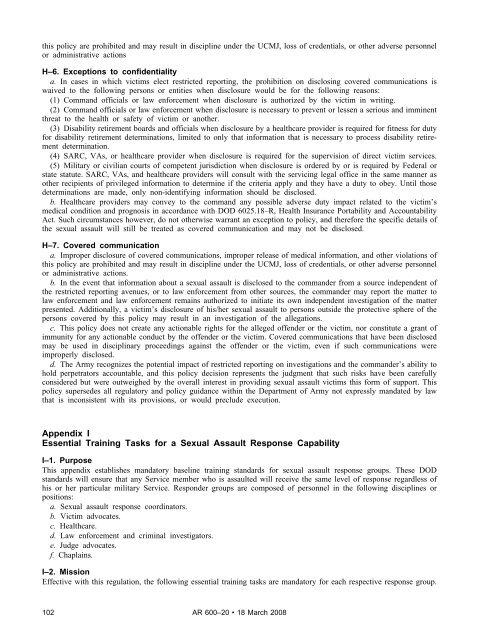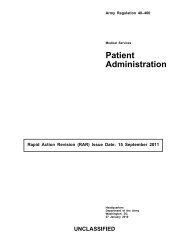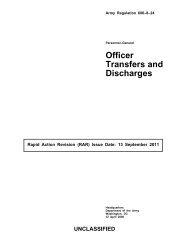AR 600-20, Army Command Policy - Army Publishing Directorate ...
AR 600-20, Army Command Policy - Army Publishing Directorate ...
AR 600-20, Army Command Policy - Army Publishing Directorate ...
You also want an ePaper? Increase the reach of your titles
YUMPU automatically turns print PDFs into web optimized ePapers that Google loves.
this policy are prohibited and may result in discipline under the UCMJ, loss of credentials, or other adverse personnel<br />
or administrative actions<br />
H–6. Exceptions to confidentiality<br />
a. In cases in which victims elect restricted reporting, the prohibition on disclosing covered communications is<br />
waived to the following persons or entities when disclosure would be for the following reasons:<br />
(1) <strong>Command</strong> officials or law enforcement when disclosure is authorized by the victim in writing.<br />
(2) <strong>Command</strong> officials or law enforcement when disclosure is necessary to prevent or lessen a serious and imminent<br />
threat to the health or safety of victim or another.<br />
(3) Disability retirement boards and officials when disclosure by a healthcare provider is required for fitness for duty<br />
for disability retirement determinations, limited to only that information that is necessary to process disability retirement<br />
determination.<br />
(4) S<strong>AR</strong>C, VAs, or healthcare provider when disclosure is required for the supervision of direct victim services.<br />
(5) Military or civilian courts of competent jurisdiction when disclosure is ordered by or is required by Federal or<br />
state statute. S<strong>AR</strong>C, VAs, and healthcare providers will consult with the servicing legal office in the same manner as<br />
other recipients of privileged information to determine if the criteria apply and they have a duty to obey. Until those<br />
determinations are made, only non-identifying information should be disclosed.<br />
b. Healthcare providers may convey to the command any possible adverse duty impact related to the victim’s<br />
medical condition and prognosis in accordance with DOD 6025.18–R, Health Insurance Portability and Accountability<br />
Act. Such circumstances however, do not otherwise warrant an exception to policy, and therefore the specific details of<br />
the sexual assault will still be treated as covered communication and may not be disclosed.<br />
H–7. Covered communication<br />
a. Improper disclosure of covered communications, improper release of medical information, and other violations of<br />
this policy are prohibited and may result in discipline under the UCMJ, loss of credentials, or other adverse personnel<br />
or administrative actions.<br />
b. In the event that information about a sexual assault is disclosed to the commander from a source independent of<br />
the restricted reporting avenues, or to law enforcement from other sources, the commander may report the matter to<br />
law enforcement and law enforcement remains authorized to initiate its own independent investigation of the matter<br />
presented. Additionally, a victim’s disclosure of his/her sexual assault to persons outside the protective sphere of the<br />
persons covered by this policy may result in an investigation of the allegations.<br />
c. This policy does not create any actionable rights for the alleged offender or the victim, nor constitute a grant of<br />
immunity for any actionable conduct by the offender or the victim. Covered communications that have been disclosed<br />
may be used in disciplinary proceedings against the offender or the victim, even if such communications were<br />
improperly disclosed.<br />
d. The <strong>Army</strong> recognizes the potential impact of restricted reporting on investigations and the commander’s ability to<br />
hold perpetrators accountable, and this policy decision represents the judgment that such risks have been carefully<br />
considered but were outweighed by the overall interest in providing sexual assault victims this form of support. This<br />
policy supersedes all regulatory and policy guidance within the Department of <strong>Army</strong> not expressly mandated by law<br />
that is inconsistent with its provisions, or would preclude execution.<br />
Appendix I<br />
Essential Training Tasks for a Sexual Assault Response Capability<br />
I–1. Purpose<br />
This appendix establishes mandatory baseline training standards for sexual assault response groups. These DOD<br />
standards will ensure that any Service member who is assaulted will receive the same level of response regardless of<br />
his or her particular military Service. Responder groups are composed of personnel in the following disciplines or<br />
positions:<br />
a. Sexual assault response coordinators.<br />
b. Victim advocates.<br />
c. Healthcare.<br />
d. Law enforcement and criminal investigators.<br />
e. Judge advocates.<br />
f. Chaplains.<br />
I–2. Mission<br />
Effective with this regulation, the following essential training tasks are mandatory for each respective response group.<br />
102 <strong>AR</strong> <strong>600</strong>–<strong>20</strong> 18 March <strong>20</strong>08
















